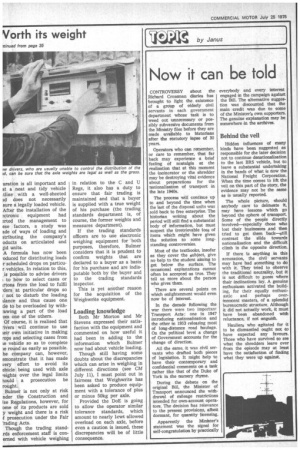Now it can be told
Page 38

If you've noticed an error in this article please click here to report it so we can fix it.
CONTROVERSY about the Richard Crossman diaries has brought to light the existence of a group of elderly civil servants in each government department whose task is to weed out unnecessary or possibly subversive documents from the Ministry files before they are made available to 'historians after the statutory lapse of 30 years.
Operators who can remember, or care to remember, that far back may experience .a brief feeling of nostalgia at the realisation that at this moment the incinerator or the shredder may be destroying vital evidence about preparations for the nationalisation of transport in the late 1940s.
The process will continue up to and beyond the time when the last of the disposal units was sold back to free enterprise. The historian writing about the period will still find a substantial body of 'information, but must suspect ;the irretrievable is of items which might have given the solution to some longstanding controversies.
Most of the textbooks, insofar as they cover the subject, give no help to the student aiming to get below the surface. The occasional explanations cannot often be accepted as true. They tell us more about the person who gives them.
There are several points on which enlightenment would even now be of interest.
In the decade following the war there were two important Transport Acts: one in 1947 introducing nationalisation and the other in 1953 releasing most of long-distance. road haulage. On the political level a change of Government accounts for the change of direction.
All the same, it was civil servants who drafted both pieces of legislation. It might help to have their contemporary and confidential comments on a task rather like that of the Duke of York in the nursery rhyme.
During the debate on the original Bill, the Minister of Transport announced the withdrawal of mileage restrictions intended for own-account operators, The decision has relevance to the present provisions, albeit dormant, for quantity licensing.
Apparently the Minister's statement was the signal for self-congratulation by practically everybody and every interest engaged in the campaign against the Bill. The alternative suggestion was discounted that the main credit was due to some of the Minister's own supporters. The genuine explanation may be somewhere in the archives.
Behind the veil
Hidden influences of many kinds have been suggested as responsible for the later decision not to continue denationalisation to the last BRS vehicle, hat to leave a substantial undertaking in the hands of what is now the National Freight Corporation. Wlhen the time comes to lift the veil on this part of the story, the evidence may not be the same as is usually reported.
The Whole picture, should anybody care to delineate it, may have lessons which go beyond the sphere of transport. Some of the people directly involved—especially those wiho lost their businesses and then tried to get them back--still contrast the slide towards nationalisation and the difficult climb in the opposite direction.
If there is anything in this accusation, the civil servants may have had something to do with it. They tried to observe the traditional neutrality, but it is not difficult to guess where their inclinations lay. A genuine enthusiasm activated the building, for their equally enthusiastic and perhaps overinnocent masters, of a splendid bureaucratic ,structure, Although it did not actually work, it must have been abandoned with reluctance, if not anguish.
Hauliers who agitated for it to be dismantled ought not to have expected any favours. Those who have survived to see what the shredders leave over from the episode may at least have the satisfaction of finding what they were up against.




































































































